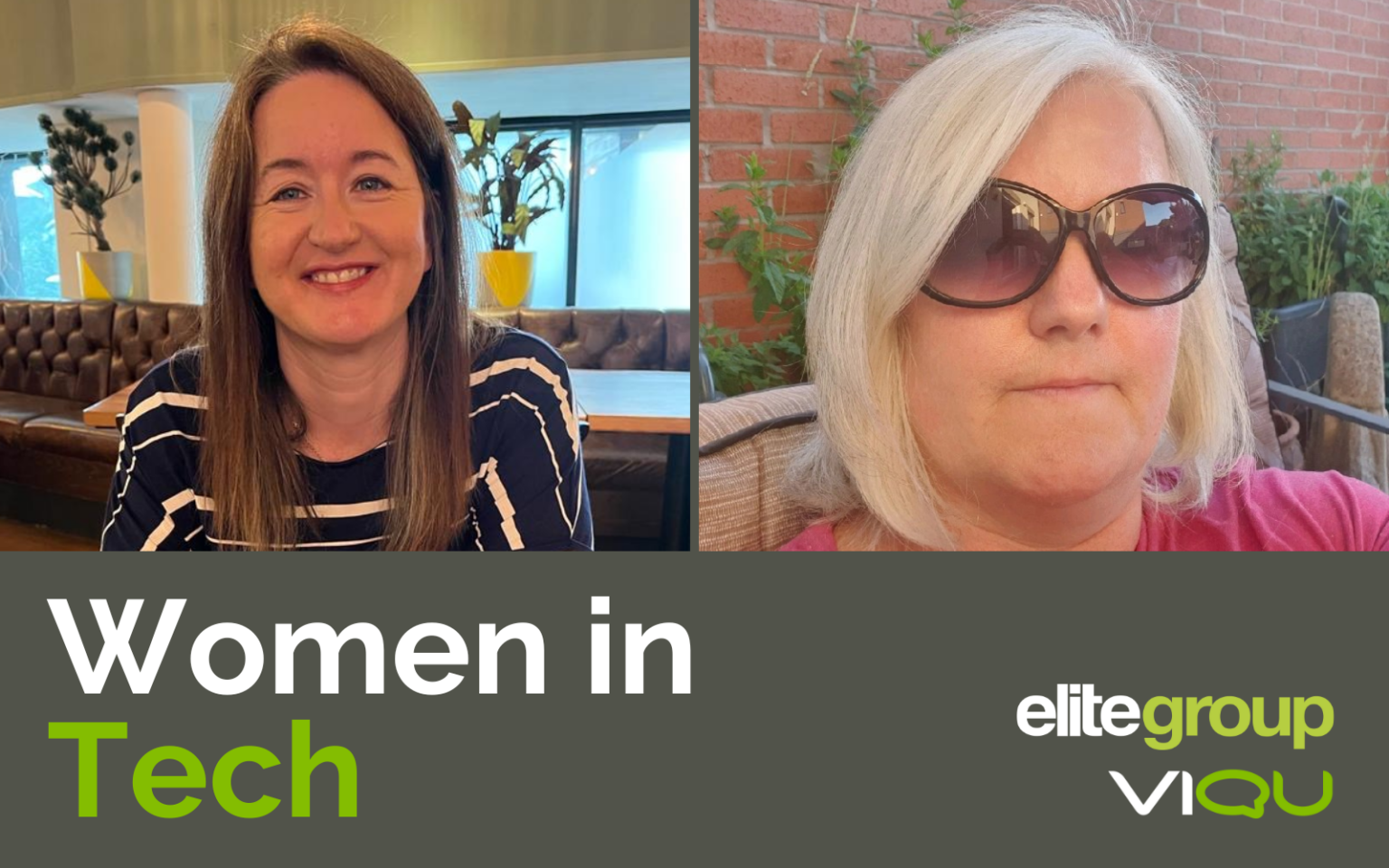Women In Tech: Interview With Elite Group’s Kirsten Jacobs & Sian Rogers

In the latest interview for our Women in Tech series, I spoke with Elite Group’s Systems Engineer, Kirsten Jacobs, and Senior Software Developer, Sian Rogers about how they both got started in IT, their thoughts on the number of women in tech, and how businesses can do more to support diversity in the industry.
What is your current role and core responsibilities?
Kirsten: I am a Systems Engineer at Elite Group. In essence, this means I diagnose and resolve hardware, software and network issues for clients. I also monitor and maintain client systems and provide technical support to them where needed.
Sian: I work as a Senior Software Developer at Elite Group. As a developer, I design, write, test, and debug software applications. Being in a senior role within the team means that I oversee development projects. So, I make decisions over which tasks to prioritise in the development lifecycle, collaborate with other members of the team to make things happen, and communicate with our clients and other key stakeholders.
How did you get started in IT?
Kirsten: I left school and started an apprenticeship with a building company to be a quantity surveyor. I left this role to follow my childhood ambition to join the RAF, where I worked as an Intelligence Analyst in their communications department.
Sian: I actually didn’t start my career in IT until I was in my mid to late 20’s. I was drifting around unsure what I wanted to do long-term, when I saw an advertisement for a short IT pathway course with a training/recruitment company. I had been interested in computers since university, so I decided to dig into the last of a little inheritance and invested it in myself. Taking the course was one of the best decisions I ever made as it led to a job as an IT Support Engineer, subcontracted to a multi-national company called Tetra Pak.
Can you share how your career has evolved to where it is today?
Kirsten: I was in a technical role in the RAF, however, security clearances made it hard to do this role within a civil environment, so I saw a lot of colleagues leave and move into other areas of IT using the technical element of our skillset.
After leaving the RAF, I spent a couple of years temping whilst we relocated and set up home in North Wales. One of those jobs was at Yale College in their finance department. Through them, I studied a CISCO networking course and joined their IT team on a permanent basis.
I spent the next 15 years working as a 2nd Line Engineer and ultimately team leader for that department, and took voluntary redundancy when all the local colleges merged. I had done a Certificate of Education at Yale, as my role often involved training and I’d covered for IT teaching staff on sick leave etc. So again, I temped, this time as a teacher.
I then joined MWL full-time on the helpdesk, subsequently becoming a full-time 2nd Line Engineer for Elite Group when MWL was bought out.
Sian: I worked in IT support for around 6 years, eventually reaching the position of 3rd Line Engineer. I enjoyed IT support, but software development was what I was really interested in. So, during those years, I studied in my own time for a degree in Computing with The Open University. I graduated in 2011 achieving a 2.1.
This new qualification led to me changing job roles to software development. I was promoted to Senior Software Developer in September 2022.
Have you noticed a lack of women in the technology industry throughout your career? If yes, how has this changed as your career has progressed?
Kirsten: Yes, unfortunately, it doesn’t appear to be an industry that appeals to many women. I would say I haven’t noticed any more in my environment than when I first started back in 2000. At my son’s university graduation in 2022, I noticed that probably 80% of the computer graduates or more were male.
Sian: I agree with Kristen. I have always worked with companies that employed plenty of women. However, for most of my career, I have been the only woman in a technical role. I am seeing more and more women in technology in roles like project management, so I hope it will just be a matter of time before gender diversity is reflected in technical roles too.
Do you believe your gender has ever impacted the way you have been perceived or treated in your career?
Kirsten: I wouldn’t say I’ve experienced anything out of the ordinary. I have had male customers ask to speak to one of the engineers rather than me and be very confused when informed that I was the engineer. The general response tends to be, “Oh I thought you were all male”.
Sian: I’ve definitely had similar experiences to Kristen. I’ve never been treated differently by the men I have worked with; however, one or two customers have been sexist.
I remember just after starting with a new employer, I answered a support call and the customer told me to “get one of the lads on the phone instead”. I muttered my irritations under my breath and went on to resolve his issue with no problem.
Kristen: Generally, within the work environment, with the exception of one manager in a previous company who appeared to have issues with females in general, I’ve never felt undermined by teammates or management.
I guess having never really been a “girly girl” and always working and socialising within typically male-dominated environments means I’ve never really experienced anything different. I have always been in a minority work and hobby-wise, but have found that if you do your job well and work hard you are treated the same as everyone else.
What do you think businesses should be doing to encourage more girls and young women to consider careers in technology?
Kirsten: Personally, I struggle with how IT has always been portrayed as nerds in a basement gaming. I think divorcing careers in IT from that image would go a long way in encouraging more school-aged girls to get involved.
Sian: That’s very true! I think encouraging young girls to do work experience placements in IT environments would show them how different the reality of IT is! Companies should also actively promote the women in their teams at recruitment fares, school career talks etc. It would help girls realise that careers in IT are open to them.
Kristen: I think it’d also be good to promote the huge array of tech careers. For instance, showing the customer service side of technology in roles like 1st and 2nd line support. Speaking generally, lots of women have soft skills that align brilliantly with certain tech careers.
Companies need to move away from requiring degrees for entry-level positions. Get them in the system to start with through apprenticeships and they can progress to a consultancy-type role and do a sponsored degree to further that knowledge at a more advanced level.
What is the one piece of advice you would give to a young woman looking to enter the industry or just at the beginning of her career in technology?
Kirsten: My advice to anyone entering the industry would be – don’t bluff! Proactively look to learn from more experienced colleagues.
I’d also say to look for mentors and people who want to help you pursue a career in IT. When you approached me about taking part in this interview, I asked my 20-year-old daughter (who is studying a degree in BioMed) how many of her school friends went into IT or are studying it. She couldn’t think of a single one, and said to me, “IT tends to be all boys, very few girls are encouraged to get into it”.
When I asked her to expand, she said teachers would actively say to boys that they were good at IT and should consider studying it, but she never heard a teacher say that to a girl. She also compared it to the sciences, saying girls are encouraged to do Biology or Chemistry (at a push!), but never Physics!
The idea that some of her female classmates could’ve been interested in going further with IT, but didn’t because they lacked people waving their flag, is very disappointing to me. So, I’d tell young people to look for individuals who will positively encourage them!
Sian: Never stop learning. The tech industry is constantly evolving, and you will need to keep up with the changes and that can be challenging at times.
It can be daunting when you are familiar with one technology, but another technology is emerging as the industry standard, but learning these new advancements is essential. It will allow you to provide the customer with the best products possible, and you can progress and grow in your career. Everyone wins!
Thank you for reading our latest Women in Tech interview with Elite Group’s Kirsten Jacobs & Sian Rogers. Access more interviews from the series, including Elite Group’s Siobhan Cole and Stephanie McMonnies, here.
Please click here to get in touch if you are looking for talented individuals to join your tech team!
Similar articles you might like...

In The Age Of Artificial Intelligence, Why Are Businesses Prioritising Female Decision-Makers?
It has been found that employing women in AI teams and leadership positions is strategically important for tech businesses as AI grows in popularity.

Q&A With Currys’ Women In Tech: Part 2
In the final half of this Q&A with Philippa, Nia and Diane from Currys, they discuss what businesses should be doing to attract more women into tech, and the advice they'd give to individuals looking to explore careers in technology.
Latest jobs
IT Risk & Controls Lead
 London, United Kingdom
London, United Kingdom
 £55k - 63k per year
£55k - 63k per year
IT Risk & Controls LeadLondon – Hybrid (2 DPM in office)Up to £63,000VIQU have partnered with a leading organisation who are seeking an IT Risk & Controls Lead to join their IT risk management team.The...
Site Supervisor
 Stone, United Kingdom
Stone, United Kingdom
 Market Related
Market Related
Job Title: Site Supervisor Location: Stone (on-site)- must have full UK Driving License. Salary: market- relatedVIQU has partnered with a top engineering company seeking a Site Supervisor to create and manage project plans. The...
Installation Co-Ordinator
 Winchester, United Kingdom
Winchester, United Kingdom
 £250 - 350 per day
£250 - 350 per day
Installation Co-Ordinator – 3-month contract – Hampshire My customer is looking for a proactive and organised Installations Co-Ordinator to manage and support the installation of IT products and services across their trade and supply locations....
Network and Security Specialist
 London, United Kingdom
London, United Kingdom
 Market related
Market related
Network and Security SpecialistLondon – Hybrid (4 days weekly in office)Competitive Salary + Car allowanceVIQU have partnered with a prestigious Fortune 500 company that is looking to hire a Network and Security Specialist. The Network...
Financial Accountant
 Stone, United Kingdom
Stone, United Kingdom
 Market related
Market related
Financial AccountantStone - HybridCompetitive SalaryVIQU have partnered with a leading entity in operational technology and digital transformation. Operating in highly regulated and demanding industrial sectors, they have successfully executed pivotal projects across energy, nuclear, renewables,...

